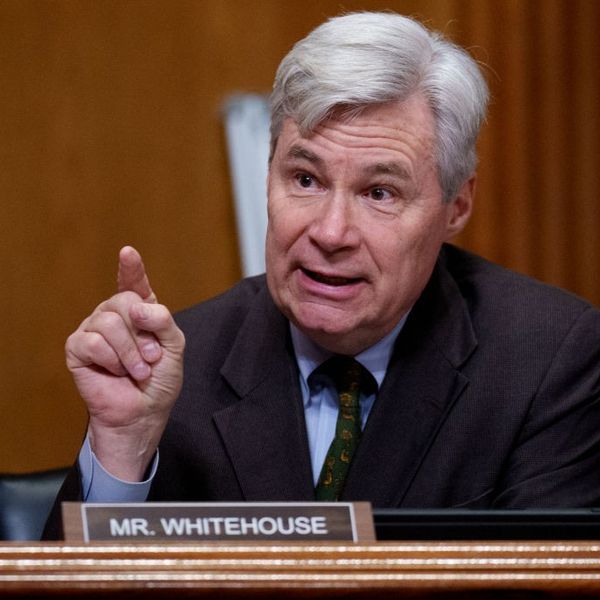
Dozens of New York residents with the organization Rise and Resist, as well as co-sponsor Rainforest Action Network, demanded an end to JPMorgan Chase's financing of the climate emergency during a demonstration at the bank's new headquarters in central Manhattan on November 20, 2019. (Photo: Erik McGregor/LightRocket via Getty Images)
Majority of Voters Want Government to Rein In Wall Street's Climate Destruction: Poll
"It's time that the U.S. government take the reins back from Wall Street so we can assure the rapid, justice-centered decarbonization necessary for a livable planet."
A new poll released Monday shows that large majorities of voters in the United States want the federal government to bolster its regulation of big banks, insurers, and other financial institutions to prevent climate-driven economic crises.
As Common Dreams has reported in the past month, recent studies have shown that Wall Street is a primary driver of the climate emergency.
"Financial regulators have an obligation to use all of the tools that they already have to immediately start protecting the financial system and frontline communities from Wall Street's contributions to climate chaos."
--Yevgeny Shrago, Public Citizen
The world's 60 largest banks have poured more than $3.8 trillion into the fossil fuel industry since the Paris agreement was signed in 2015. Furthermore, a substantial percentage of banks' boardrooms have members with deep ties to polluting companies, including many coal, gas, and oil corporations that are primarily responsible for pushing the emissions of heat-trapping greenhouse gasses to record levels by continuing to extract and burn dirty energy sources.
Polling conducted in January and March by Data for Progress suggests that many in the U.S. public are keenly aware of this robust connection between financial institutions' investments and environmental destruction, and they want federal regulators--including those at the Treasury Department, the Federal Reserve, the Securities and Exchange Commission, and elsewhere--to enact new financial reforms that address climate risks.
According to the survey (pdf), an overwhelming percentage of voters across age groups, education levels, and geographies support the federal government taking strong action to rein in Wall Street in order to prevent financiers from laying the groundwork for future climate-driven economic crises by continuing with business as usual.
\u201cNEW CLIMATE POLL: By a +37 point margin, national voters say they support federal actions to prevent a future financial and economic crisis driven by climate change. \n\nAnalysis from @danielledeis in our full memo:\nhttps://t.co/oC73M1Jyhc\u201d— Data for Progress (@Data for Progress) 1618255648
Data for Progress found that overall, three-fifths of voters agree the federal government should enforce more financial safeguards on big banks and insurers to prevent a future economic crisis driven by climate change. Less than a quarter of voters disagree.
Support for climate-related financial regulation was almost identical for voters under 45 (61%) and over 45 (59%). In addition, a majority of non-college-educated (55%) and college-educated (66%) voters, and a majority of rural (61%), suburban (59%), and urban (57%) voters all support the federal government enforcing more safeguards on financial institutions to prevent future climate-driven crises.
Other key findings from Data for Progress include:
- A majority of voters (62%) agree the government should enact mandatory climate risk disclosure rules;
- By a 35-percentage-point margin, voters prefer for the federal government to enforce climate risk disclosure rules rather than let Wall Street "self-regulate" their climate risk disclosures;
- Nearly two-thirds of voters (63%) agree the Treasury and Federal Reserve should play an active role in protecting the financial system from a future financial crisis driven by climate change; and
- A majority of voters (62%) agree that banks making investments in industries that exacerbate climate change should also make investments in frontline communities.
Data for Progress also found that "drawing a comparison between Wall Street's activities that led to the 2008 recession and their current investments in projects and industries that drive climate change resonates with voters across different age groups, education levels, and geographies."
A majority of all voters (55%) agree that "if left unchecked, Wall Street will catalyze another financial crisis, though this time it will be driven by climate change." Younger, college-educated, and urban voters agree most strongly with that sentiment, but large percentages of voters across those categories concur.

Notably, voters support by a 31-point margin the establishment of a national green bank or the use of "green bonds " to incentivize private investments in new green infrastructure and clean energy development, with 58% for and 27% against.

The new findings regarding voters' support for curbing the financial industry's exacerbation of the climate emergency through increased federal oversight come as the Biden administration is reportedly finalizing an executive order to "develop a strategy on climate-related risks for public and private financial assets."
In response to the polling data, members of the Stop the Money Pipeline coalition issued a joint statement.
"Climate policy has so far been left to markets, and now we're in a climate crisis," said Moira Birss, climate and finance director at Amazon Watch. "It's time that the U.S. government take the reins back from Wall Street so we can assure the rapid, justice-centered decarbonization necessary for a livable planet."
Yevgeny Shrago, policy counsel at Public Citizen, agreed.
"Banks, insurers, and asset managers have been gambling with our health and our future for too long," Shrago said. "Financial regulators have an obligation to use all of the tools that they already have to immediately start protecting the financial system and frontline communities from Wall Street's contributions to climate chaos."
An Urgent Message From Our Co-Founder
Dear Common Dreams reader, The U.S. is on a fast track to authoritarianism like nothing I've ever seen. Meanwhile, corporate news outlets are utterly capitulating to Trump, twisting their coverage to avoid drawing his ire while lining up to stuff cash in his pockets. That's why I believe that Common Dreams is doing the best and most consequential reporting that we've ever done. Our small but mighty team is a progressive reporting powerhouse, covering the news every day that the corporate media never will. Our mission has always been simple: To inform. To inspire. And to ignite change for the common good. Now here's the key piece that I want all our readers to understand: None of this would be possible without your financial support. That's not just some fundraising cliche. It's the absolute and literal truth. We don't accept corporate advertising and never will. We don't have a paywall because we don't think people should be blocked from critical news based on their ability to pay. Everything we do is funded by the donations of readers like you. Will you donate now to help power the nonprofit, independent reporting of Common Dreams? Thank you for being a vital member of our community. Together, we can keep independent journalism alive when it’s needed most. - Craig Brown, Co-founder |
A new poll released Monday shows that large majorities of voters in the United States want the federal government to bolster its regulation of big banks, insurers, and other financial institutions to prevent climate-driven economic crises.
As Common Dreams has reported in the past month, recent studies have shown that Wall Street is a primary driver of the climate emergency.
"Financial regulators have an obligation to use all of the tools that they already have to immediately start protecting the financial system and frontline communities from Wall Street's contributions to climate chaos."
--Yevgeny Shrago, Public Citizen
The world's 60 largest banks have poured more than $3.8 trillion into the fossil fuel industry since the Paris agreement was signed in 2015. Furthermore, a substantial percentage of banks' boardrooms have members with deep ties to polluting companies, including many coal, gas, and oil corporations that are primarily responsible for pushing the emissions of heat-trapping greenhouse gasses to record levels by continuing to extract and burn dirty energy sources.
Polling conducted in January and March by Data for Progress suggests that many in the U.S. public are keenly aware of this robust connection between financial institutions' investments and environmental destruction, and they want federal regulators--including those at the Treasury Department, the Federal Reserve, the Securities and Exchange Commission, and elsewhere--to enact new financial reforms that address climate risks.
According to the survey (pdf), an overwhelming percentage of voters across age groups, education levels, and geographies support the federal government taking strong action to rein in Wall Street in order to prevent financiers from laying the groundwork for future climate-driven economic crises by continuing with business as usual.
\u201cNEW CLIMATE POLL: By a +37 point margin, national voters say they support federal actions to prevent a future financial and economic crisis driven by climate change. \n\nAnalysis from @danielledeis in our full memo:\nhttps://t.co/oC73M1Jyhc\u201d— Data for Progress (@Data for Progress) 1618255648
Data for Progress found that overall, three-fifths of voters agree the federal government should enforce more financial safeguards on big banks and insurers to prevent a future economic crisis driven by climate change. Less than a quarter of voters disagree.
Support for climate-related financial regulation was almost identical for voters under 45 (61%) and over 45 (59%). In addition, a majority of non-college-educated (55%) and college-educated (66%) voters, and a majority of rural (61%), suburban (59%), and urban (57%) voters all support the federal government enforcing more safeguards on financial institutions to prevent future climate-driven crises.
Other key findings from Data for Progress include:
- A majority of voters (62%) agree the government should enact mandatory climate risk disclosure rules;
- By a 35-percentage-point margin, voters prefer for the federal government to enforce climate risk disclosure rules rather than let Wall Street "self-regulate" their climate risk disclosures;
- Nearly two-thirds of voters (63%) agree the Treasury and Federal Reserve should play an active role in protecting the financial system from a future financial crisis driven by climate change; and
- A majority of voters (62%) agree that banks making investments in industries that exacerbate climate change should also make investments in frontline communities.
Data for Progress also found that "drawing a comparison between Wall Street's activities that led to the 2008 recession and their current investments in projects and industries that drive climate change resonates with voters across different age groups, education levels, and geographies."
A majority of all voters (55%) agree that "if left unchecked, Wall Street will catalyze another financial crisis, though this time it will be driven by climate change." Younger, college-educated, and urban voters agree most strongly with that sentiment, but large percentages of voters across those categories concur.

Notably, voters support by a 31-point margin the establishment of a national green bank or the use of "green bonds " to incentivize private investments in new green infrastructure and clean energy development, with 58% for and 27% against.

The new findings regarding voters' support for curbing the financial industry's exacerbation of the climate emergency through increased federal oversight come as the Biden administration is reportedly finalizing an executive order to "develop a strategy on climate-related risks for public and private financial assets."
In response to the polling data, members of the Stop the Money Pipeline coalition issued a joint statement.
"Climate policy has so far been left to markets, and now we're in a climate crisis," said Moira Birss, climate and finance director at Amazon Watch. "It's time that the U.S. government take the reins back from Wall Street so we can assure the rapid, justice-centered decarbonization necessary for a livable planet."
Yevgeny Shrago, policy counsel at Public Citizen, agreed.
"Banks, insurers, and asset managers have been gambling with our health and our future for too long," Shrago said. "Financial regulators have an obligation to use all of the tools that they already have to immediately start protecting the financial system and frontline communities from Wall Street's contributions to climate chaos."
A new poll released Monday shows that large majorities of voters in the United States want the federal government to bolster its regulation of big banks, insurers, and other financial institutions to prevent climate-driven economic crises.
As Common Dreams has reported in the past month, recent studies have shown that Wall Street is a primary driver of the climate emergency.
"Financial regulators have an obligation to use all of the tools that they already have to immediately start protecting the financial system and frontline communities from Wall Street's contributions to climate chaos."
--Yevgeny Shrago, Public Citizen
The world's 60 largest banks have poured more than $3.8 trillion into the fossil fuel industry since the Paris agreement was signed in 2015. Furthermore, a substantial percentage of banks' boardrooms have members with deep ties to polluting companies, including many coal, gas, and oil corporations that are primarily responsible for pushing the emissions of heat-trapping greenhouse gasses to record levels by continuing to extract and burn dirty energy sources.
Polling conducted in January and March by Data for Progress suggests that many in the U.S. public are keenly aware of this robust connection between financial institutions' investments and environmental destruction, and they want federal regulators--including those at the Treasury Department, the Federal Reserve, the Securities and Exchange Commission, and elsewhere--to enact new financial reforms that address climate risks.
According to the survey (pdf), an overwhelming percentage of voters across age groups, education levels, and geographies support the federal government taking strong action to rein in Wall Street in order to prevent financiers from laying the groundwork for future climate-driven economic crises by continuing with business as usual.
\u201cNEW CLIMATE POLL: By a +37 point margin, national voters say they support federal actions to prevent a future financial and economic crisis driven by climate change. \n\nAnalysis from @danielledeis in our full memo:\nhttps://t.co/oC73M1Jyhc\u201d— Data for Progress (@Data for Progress) 1618255648
Data for Progress found that overall, three-fifths of voters agree the federal government should enforce more financial safeguards on big banks and insurers to prevent a future economic crisis driven by climate change. Less than a quarter of voters disagree.
Support for climate-related financial regulation was almost identical for voters under 45 (61%) and over 45 (59%). In addition, a majority of non-college-educated (55%) and college-educated (66%) voters, and a majority of rural (61%), suburban (59%), and urban (57%) voters all support the federal government enforcing more safeguards on financial institutions to prevent future climate-driven crises.
Other key findings from Data for Progress include:
- A majority of voters (62%) agree the government should enact mandatory climate risk disclosure rules;
- By a 35-percentage-point margin, voters prefer for the federal government to enforce climate risk disclosure rules rather than let Wall Street "self-regulate" their climate risk disclosures;
- Nearly two-thirds of voters (63%) agree the Treasury and Federal Reserve should play an active role in protecting the financial system from a future financial crisis driven by climate change; and
- A majority of voters (62%) agree that banks making investments in industries that exacerbate climate change should also make investments in frontline communities.
Data for Progress also found that "drawing a comparison between Wall Street's activities that led to the 2008 recession and their current investments in projects and industries that drive climate change resonates with voters across different age groups, education levels, and geographies."
A majority of all voters (55%) agree that "if left unchecked, Wall Street will catalyze another financial crisis, though this time it will be driven by climate change." Younger, college-educated, and urban voters agree most strongly with that sentiment, but large percentages of voters across those categories concur.

Notably, voters support by a 31-point margin the establishment of a national green bank or the use of "green bonds " to incentivize private investments in new green infrastructure and clean energy development, with 58% for and 27% against.

The new findings regarding voters' support for curbing the financial industry's exacerbation of the climate emergency through increased federal oversight come as the Biden administration is reportedly finalizing an executive order to "develop a strategy on climate-related risks for public and private financial assets."
In response to the polling data, members of the Stop the Money Pipeline coalition issued a joint statement.
"Climate policy has so far been left to markets, and now we're in a climate crisis," said Moira Birss, climate and finance director at Amazon Watch. "It's time that the U.S. government take the reins back from Wall Street so we can assure the rapid, justice-centered decarbonization necessary for a livable planet."
Yevgeny Shrago, policy counsel at Public Citizen, agreed.
"Banks, insurers, and asset managers have been gambling with our health and our future for too long," Shrago said. "Financial regulators have an obligation to use all of the tools that they already have to immediately start protecting the financial system and frontline communities from Wall Street's contributions to climate chaos."

